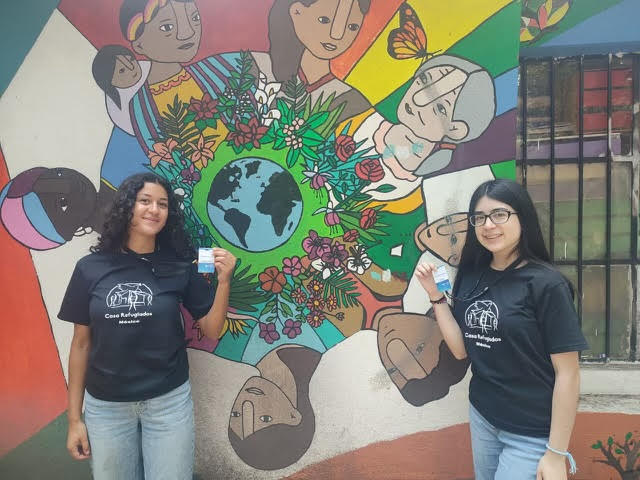Summer Centered: Alexandra Stevens '25, and Keyla Ramirez '25 on Refugee Advocacy in Mexico City

Alexandra Stevens ‘25 (left), and Keyla Ramirez ‘25 outside Casa Refugiados headquarters.
Details
From Caracas to Chicago- the global refugee crisis is at our doorsteps. Hear how two Haverford students spent ten weeks this summer in Mexico City working for a local aid organization providing assistance to the displaced, through a paid CPGC fellowship.
Article Edited by Martin Evans '75
Amidst a pan-American refugee crisis that is being felt from Caracas to Chicago, two Haverford students this summer spent ten weeks in Mexico City working for a local aid organization that provides assistance to the displaced, under a paid fellowship administered by Haverford’s Center for Peace and Global Citizenship.
Alexandra Stevens '25, and Keyla Ramirez '25 worked with Casa Refugiados, a United Nations-affiliated organization that is battling a growing humanitarian crisis caused by the rapid increase in the number of refugees fleeing poverty or violence in various locales south of the U.S. border.
The students were supported under a Haverford initiative that provides $4,000 stipends, often including travel costs as well, to encourage students to do work that advances peace, justice, inclusivity, and sustainability. Selected students receive stipends through the CPGC’s Summer Fellowship program, which typically pairs students with partner organizations.
Applications are prioritized by how closely proposed projects align with the missions of endowments that support the internships. Various endowments fund projects that advance democracy-promotion, humanitarian engagement in the Middle East, environmental policy work, health and education in Asia, or work with indigenous organizations.
As a CPGC partner organization, Casa Refugiados selects Spanish-speaking Haverford applicants to assist with its work providing refugees in Mexico City with critical resources and support networks.
Poverty and violence in parts of Central and South America and the Caribbean have unleashed a massive flow of immigrants headed north. With thousands of refugees being turned away at the U.S. border each day, many wait in crowded camps scattered across Mexico. At Mexico City’s Cafemin shelter, refugees often must wait an hour to find an available toilet and three days to shower, according to National Public Radio.
“The scene today is chaos,” NPR reporter James Fredrick said during a June visit to Cafemin. “Every bit of space in the common area is taken up by people trying to find somewhere where they can lay down.”
During their internships, Ramirez and Stevens each did research on an aspect of the lives of refugees who came to Casa Refugiados for help.
Ramirez examined the factors that caused refugees to be displaced from their homes across the continental divide, and the types of employment opportunities available to them once they reached Mexico City. Stevens looked into the unique struggles of Haitian migrants, and how a lack of fluency in Spanish impacted their ability to integrate into Mexican society.
Stevens, a History and Latinex Studies major, and Ramirez, an Economics major, came to the program with different backgrounds, but found ways to bring their own interests into dialogue with the research which they conducted.
The fellows assembled reference material pertaining to their respective research, which they shared with Casa Refugiados staff. They interacted with Mexican high school student volunteers who also worked at the aid organization. And they assembled first-hand accounts of the experiences of the refugees, which broadened their understanding of the challenges they faced.
Stevens, for whom Spanish is a second language, said the experience was especially beneficial for her because it sharpened her speaking ability. “They (the staff and community) made me feel like my opinion still mattered even if I didn't get everything out perfectly,” Stevens said.
Ramirez, for whom Spanish was a first language, agreed, adding “I feel like people were very welcoming.”
They said they especially appreciated the program's location in Mexico City’s historic Escandón neighborhood, which immersed them in the local culture. They described Escandón as rich in colonial architecture, and within walking distance of dozens of museums, parks and local eateries.
For Fords looking to make tangible change through intentional scholastic research, Casa Refugiados presents an exciting opportunity. Students interested in participating in the summer program in 2024 can visit the CPGC website for more information on application deadlines and material requirements.




